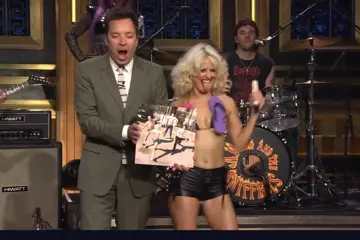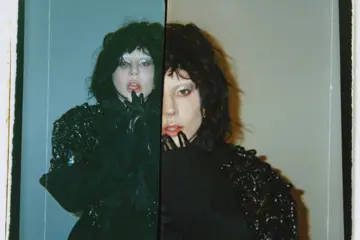
Deadpool, as character, was born out of the irony-rich, totally-meta ’90s, swiftly morphing from generic villain into motor-mouth’d anti-hero, crackin’ wise not just about your mama, but about the constructs of comics, the conventions of super-hero narratives, the constraints of genre. The to-screen translation of Wade Wilson comes at a perfect time: the clichés of the comic-book movie having become utterly entrenched.
With Marvel having turned cinema release sheets into a horrifying exercise in sustained billion-dollar branding, yet another film finding the world being saved from intergalactic evil by a team of intellectual-properties in silly costumes can provoke only weariness. But a film that offers a running commentary on the genre —mocking all those tired tropes so you don’t have to— is something to be welcomed with open arms.
In its ongoing mockery of the genre it’s operating in, Deadpool is plenty funny. But it’s not just the jokes about the millions needed to make a blockbuster, the awfulness of CGI, and the contrivance of creating a heroic character that’re funny. Not every one-liner is a self-aware comic critique, sometimes they’re just delightfully absurd non-sequiturs. “I’m about to do to you what Limp Bizkit did to music in the late-’90s,” threatens Ryan Reynolds to a stooge, at one point; the best of pop-cultural references that range from Taken nightmares to Wham! earning their exclamation mark. And Reynolds, a let’s-just-say ‘much-maligned’ star, is right in his wheelhouse, here, at home in a role which requires him to be a wise-crackin’ dick who takes his shirt off.
With its impish sense-of-humour ever-present, Deadpool delivers gag after gag, the tone of mockery —of genre, of actor, of anything— only abating for the key flashbackin’ origin/villain/motivation sequence that must exist for audience’ to morally ‘allow’ this caped-crusader to slay countless anonymous henchmen. Writers Rhett Reese and Paul Wernick turned a similar trick with 2009’s Zombieland: delivering constant comedy, skewering pop-cultural gags, and a critique/correction of genre as it went (they also wrote G.I. Joe: Retaliation, which, in the light of Deadpool, can easily be reappraised as parody of cinematic stupidity, not just work thereof).
Whilst Deadpool will please those tired of sitting through self-important superhero extravaganzas, it should also please fans of the genre; the general air cultivated is one of ‘in-on-the-joke’ audience flattery. There’s two X-Men alumni, CGI colossus and Brianna Hildebrand’s Negasonic Teenage Warhead, to tie it into Fox’s greater X-Men universe, but even their presence is a joke; the fact that you only see ever see two people in the X-Mansion a sure sign that the main franchise’s way-famous stars were too expensive for this little rinky-dink spin-off.
With a budget of $58mil, Deadpool is still an expensive piece of cinematic fodder, but compared to monolithic team-up movies, it’s loose-change. Such a budget allows director Tim Miller to play fast and loose with formula, to not worry about catering to kids or cross-promotional tie-ins or merchandise sales. Deadpool is dark, violent, sarcastic; its sense-of-humour and sensibility both border, at times, on nasty.
And if comic-books are going to be the tentpole staples of the multiplex (PS: seriously, the trailer for X-Men: Apocalypse looks fucking awful), having smaller, weirder, sillier, essentially-apologetic instalments like this feels like a necessary counter-balance.















